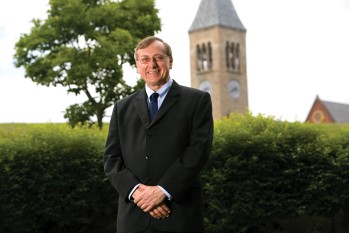VIEWPOINT
A historic moment to ensure our teaching and research legacy

Provost Kent Fuchs See larger image
Our university is on the cusp of unprecedented change. In the next decade more than half of our most distinguished teachers and scholars will be moving to emeritus status. That means that Cornell will need to hire 800 new faculty members. That's a hiring rate that will never occur again in our lifetimes.
The pre-eminence of our institution in the decades to come will be determined by the quality of the young faculty members we recruit. Thirty years from now, this talented, visionary pool of individuals will become the institution's legacy.
We must begin vigorously hiring this new faculty immediately. To do so, we have established a $100 million Cornell Faculty Renewal Fund. We have asked the college deans and the department chairs to develop hiring plans for the next five years and to reallocate monies from their budgets to focus on faculty hiring. These reallocated monies will comprise half of the faculty renewal fund. The other half will come from philanthropy; we are asking donors to make faculty renewal their priority.
Why begin hiring now? During the economic downturn of the past two years, Cornell reduced its hiring by 50 percent. And so did our competitors. At the same time the production of new Ph.D.s remained the same. If we wait until a faculty member retires – and although currently 47 percent of Cornell professors are over age 55 and 15 percent are over 65, the majority won't be retiring for another five years – and we have salaries available to us to fund new hires, we will have missed a vital opportunity. At that point, we won't be able to hire fast enough to replace those who are leaving; there won't be enough candidates on the market.
The $100 million faculty fund will be designated for current use to hire as many as 100 new faculty members a year for the next five years – a rate unprecedented at Cornell. But we must proceed wisely. We can only begin this transformative process when the monies from the fund are in hand.
We expect that 85 percent of the $50 million raised through philanthropy will go directly to the colleges and schools for their use in recruiting faculty. The remaining 15 percent we expect will be designated for the provost's discretion based on donors' wishes and cross-university faculty hiring priorities.
Each college and school is in the midst of determining strategically important academic areas of excellence in the core disciplines: humanities and arts; life sciences and agricultural sciences; physical sciences, information science and engineering; and the social sciences. Our new faculty will not necessarily be hired in those disciplines from which current faculty are expected to retire but rather in areas that are determined to be important academic disciplines now and in the years to come.
Replacing more than half the faculty provides us with an opportunity to refocus, reprioritize and create new initiatives that will define Cornell's future. The result will be a reinvigorated university. The faculty renewal fund provides the means to seize this historic moment.
Earlier this year the university published a Strategic Plan, www.cornell.edu/strategicplan, to guide us through to the 2015 Cornell sesquicentennial. Faculty renewal was the highest priority of the seven initiatives set forth in that plan. Each of us can lend a hand in shaping Cornell's future by contributing to the renewal fund to ensure that we hire the best in every field.
Kent Fuchs is Cornell's provost.